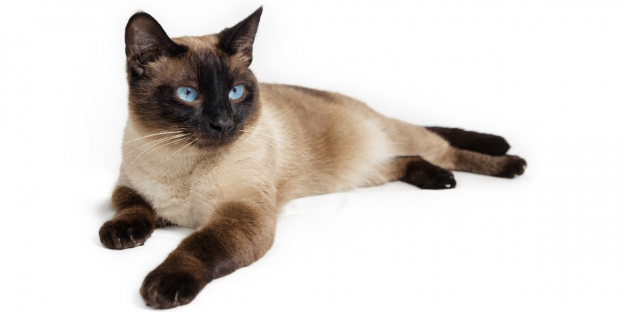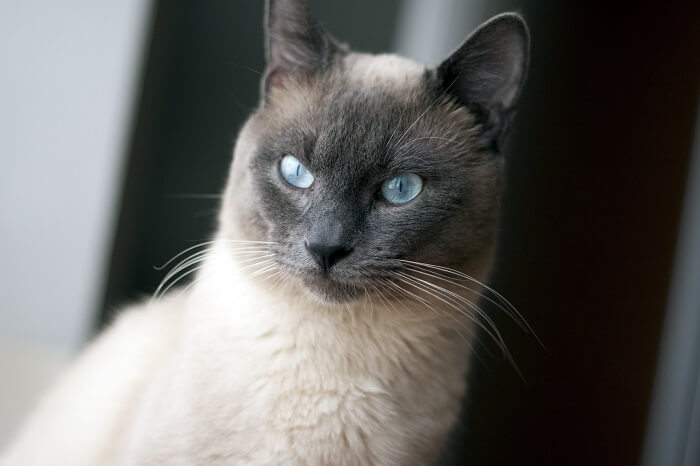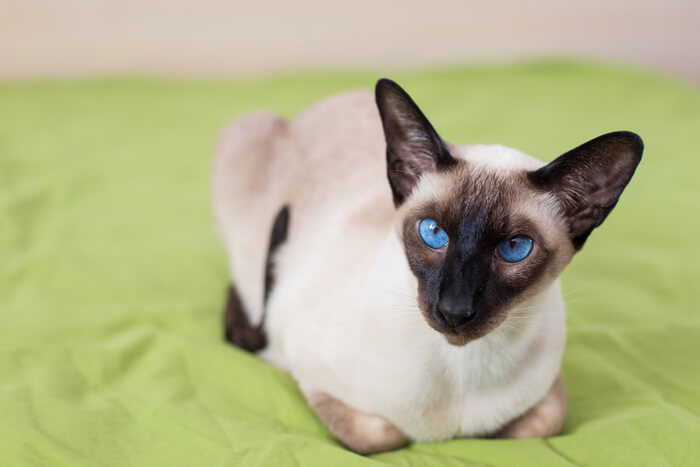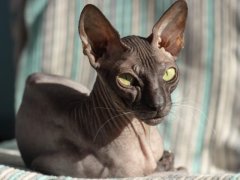As one of the most recognizable cat breeds in the world, the Siamese has a reputation for being graceful and talkative. They’ve even been described as “regal” and nicknamed the Royal Cat of Siam.
Their striking color-pointed fur complete with masks and socks makes them a favorite among cat people, and they also have another characteristic that people love: they’re considered a hypoallergenic cat breed.
While there is no such thing as a 100% hypoallergenic cat (or dog for that matter) the Siamese is included in the handful of cat breeds that are often recommended to allergy sufferers.
There’s No Such Thing as a Completely Hypoallergenic Cat
In a perfect world, cat allergies wouldn’t exist. It seems a cruel joke for someone to love cats but to break out in sneezing fits or struggle to see through swollen, watery eyes every time they pet a feline friend.
Biologically, cat allergies happen when a person’s immune system works in overdrive. When the body is exposed to the offending allergen, the cells that make up the immune system misidentify the outside substance as something harmful, like a virus or bacteria. Their response is to go on the offensive.
This triggers various bodily reactions including sneezing, itchiness, trouble breathing, and swollen or watery eyes. Different people react differently, and allergic reactions range from mild and easy to ignore all the way to severe and life-threatening depending on other contributing factors.
Contrary to what most people believe, all that trouble is not caused by cat hair alone. In fact, people who are allergic to cats are not actually allergic to their fur. The trouble is caused by a protein that is found on the cat’s skin, at the base of cat hair, in their urine, and in their saliva. This protein is called Fel d1, and every cat, even hairless cats, have it.
Breeders have attempted to develop a cat breed that does not produce Fel d1, but so far, they’ve been unsuccessful. For this reason, there is no such thing as a completely hypoallergenic cat.
A friendly Siamese might still leave behind a spattering of hairs after a good cuddle, but their shedding is considered mild compared to other breeds like the Maine Coon or Ragdoll.
Why Some Breeds are Considered Hypoallergenic
We can’t say that Siamese cats are 100% safe for allergy sufferers, but this natural breed, along with the Javanese, Cornish Rex, Sphynx, and several others, are considered the best cats for people with allergies because of a few characteristics. First, they produce less Fel d1 protein than other cat breeds. Second, Siamese cats are not big shedders.
A friendly Siamese might still leave behind a spattering of hairs after a good cuddle, but their shedding is considered mild compared to other breeds like the Maine Coon or Ragdoll.
With less offending protein on fewer shed hairs, the exposure to potential allergens is much less. And because cats are typically good at controlling where their urine and saliva go, the proteins in those substances are generally not an issue. All of this works together to provide mild to moderate allergy sufferers a chance to love on a cat without risking their health or comfort.
Studies show that the Fel d1 protein is controlled by hormones, and female felines generally produce less of the offending allergen than their male counterparts.
Other Allergy Considerations
Besides producing less Fel d1 protein and shedding less, there are other factors for allergy sufferers to consider. Allergies differ from person to person, but the following tips can help make your Siamese cat even more hypoallergenic.
Consider a Female Cat
Studies show that the Fel d1 protein is controlled by hormones, and female felines generally produce less of the offending allergen than their male counterparts. Research also shows that neutered male cats produce less Fel d1 than intact adult males.
Keep Your Pet Inside
Not only will keeping your cat inside keep them safe from things like cars and predators, but it can also help your allergies. Many people who are allergic to cats are also allergic to other substances that an outside cat can track through the house. Pollen is the main offender, and it can also happen with grass, leaves, and mold. By keeping your cat inside, you reduce the risk of outside substances coming inside to trigger your allergies.
Remove Allergy Traps
An allergy trap is anything that could potentially attract and trap cat hair and microscopic allergens. Upholstered furniture and carpet are the biggest offenders. If you have the opportunity, trading your carpet for hard flooring and your linen sofa for one made of leather or pleather will reduce your exposure to long-term allergens and make cleaning easier.
Do Laundry and Vacuum Often
Washing your blankets, pillows, and other soft surfaces that attract protein-covered cat hair will help eliminate irritating allergens. Investing in a vacuum with a HEPA filter will also reduce the number of allergens in your home.
Normal vacuums can disperse just as many airborne allergens as they remove, but HEPA filters reportedly remove 99.97% of those tiny irritants. For mild allergy sufferers, a weekly cleaning routine can be enough to keep the worst allergy symptoms at bay.
If you suffer from allergies but can’t imagine not having a cat, a Siamese may be your solution. These friendly and curious cats might trigger allergic reactions for people with severe allergies, but many people with mild to moderate allergies can cuddle a Siamese and be sneeze-free.
Also Read: The 5 Best Vacuum Cleaners For Pet Hair
Frequently Asked Questions
Are lynx point Siamese cats hypoallergenic?
Lynx Point Siamese have short fur and does not shed as much as other cat breeds. So while there is no such thing as a 100% hypoallergenic cat, the Lynx Point Siamese cat is considered more hypoallergenic than most pure breed cats.
Are flame point Siamese cats hypoallergenic?
Although Flame Point Siamese cats are considered to be hypoallergenic by some breeders, according to the Happy Cat Site the truth is that these cats are not hypoallergenic. However people with allergies might react less severely to them because their fur is fine and short.
Are Blue Point Siamese cats hypoallergenic?
Taking into considerations the Blue Point Siamese cats do shed, yet when compared to other pure bred cat breeds, they tend to shed a lot less. This why they are considered hypoallergenic cats.
Are half/mix Siamese cats hypoallergenic?
Half Siamese cats very based on the the specif cat breed that has been bred, this makes it difficult to say how people with allergies might react to these cats although it's safe to say they will cause less allergies than most other cat breeds.
-
https://pubmed.ncbi.nlm.nih.gov/8765830/
-
https://www.natlallergy.com/learning/blog/2014/01/02/laundry-advice-for-allergy-sufferers/
-
http://www.vetstreet.com/cats/siamese#0_ryz4d6cf










